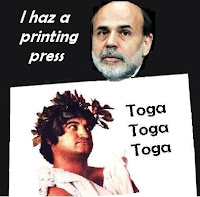This report does not include government employment.
It is considered an indicator of the national Non-Farm Payrolls Report which will be released on Friday morning.
ADP
ADP National Employment Report
Wednesday, January 7, 2009, 8:15 A.M. ET
Nonfarm private employment decreased 693,000 from November to December 2008 on a seasonally adjusted basis, according to the ADP National Employment Report®. This month’s ADP Report incorporates methodological improvements intended to improve the correspondence between the nonfarm private employment estimates shown in the ADP Report and estimates published in the Bureau of Labor Statistics’ Employment Situation Report.
December’s ADP Report estimates nonfarm private employment in the service-providing sector fell by 473,000. Employment in the goods-producing sector declined 220,000, the twenty-third consecutive monthly decline. Employment in the manufacturing sector declined 120,000, marking its twenty seventh decline over the last twenty eight months.
Large businesses, defined as those with 500 or more workers, saw employment decline 91,000, while medium-size businesses with between 50 and 499 workers declined 321,000. Employment among small-size businesses, defined as those with fewer than 50 workers, declined 281,000. (Notice the big hit taken by the smaller businesses, where most jobs had been created in the prior recovery. This is not good, and bodes ill for safe haven aspect of the broader stock equity indices. - Jesse)
Sharply falling employment at medium- and small-size businesses clearly indicates that the recession has now spread well beyond manufacturing and housing-related activities.
In December, construction employment dropped 102,000. This was its twenty-first consecutive monthly decline, and brings the total decline in construction jobs since the peak in January 2007 to 809,000.
07 January 2009
ADP Jobs Report Shows Deep Jobs Losses Across the Economy
06 January 2009
A Budget Forecast from President-elect Obama

Should we get Bernanke a truss?
Yikes!
Obama Says Deficit Likely to Approach $1 Trillion
By Julianna Goldman and Roger Runningen
Jan. 6 (Bloomberg) -- President-elect Barack Obama said he expects to inherit a $1 trillion budget deficit and that similar shortfalls are in store “for years to come” as the government grapples with a recession and other spending demands.
A “trillion dollar deficit will be here before we even start the next budget,” Obama said after meeting in Washington with his economic advisers, including Peter Orszag, who has been designated as director of the Office of Management and Budget.
“Potentially we’ve got trillion-dollar deficits for years to come, even with the economic recovery we are working on...”
Bill Poole: The Fed is Now Expanding Its Balance Sheet by Printing Money
We have long held Paul Volcker, William Poole and Jerry Jordan in high respect as former Fed governors. When they speak we listen, although Jerry seems to be more reticent, enjoying his retirement these days.
In a discussion with Kathleen Hays this afternoon during her "On the Economy" show on Bloomberg Television, Bill Poole took uncharacteristically sharp exception to the latest decisions by the Bernanke FOMC from their December Meeting minutes.
"The Fed is now expanding its balance sheet by printing money."
He was also visibly perturbed that the FOMC appears to no longer be stepping up to managing the money supply which is its mandate, but rather is allowing the Board of Governors to expand the money supply 'willy-nilly' with no eye to targets, just an uncoordinated roll out of special facilities.
For a minute we had to make sure this was Bill Poole speaking and not Willem Buiter, who delivered a round house commentary at Jackson Hole on the Bernanke Fed.
Yes, this is not the first time you have heard this, that the Fed is now printing money, monetizing the debt, especially if you are a regular reader here.
But it was unmistakable that in Bill Poole's mind the FOMC has now "crossed the Rubicon" and "will greatly regret their recent decisions in the future."
Jimmy Rogers has it right. "Bernanke’s going to keep printing money until they run out of trees."
The Fed is confident that they know how to stop inflation after the Volcker era, this much they have said, and it is clear they are acting on that belief.
A lot of theories are going to be road-tested, and the experiment in monetary and Keynesian economics will be rigorous.
This will be interesting, indeed.
Facilis descensus Averno;
Noctes atque dies patet atri ianua Ditis;
Sed revocare gradum superasque evadere ad auras,
Hoc opus, hic labor est.
Smooth is the descent, the way down below;
Day and night the gates of Hell stand wide open;
But to retrace your steps, and return to clear skies:
This is the task, this is the real work.
Vergil, Aeneid
The Treasury Bubble and the Central Banks: Imbalance à Go Go
The astute observer may notice a trend change in the way that foreign central banks choose to deploy their dollar reserves while supporting their industrial policies.
There should be little doubt why there is a bubble in Treasuries, and why the Federal Reserve is in the market buying mortgage debt.






























